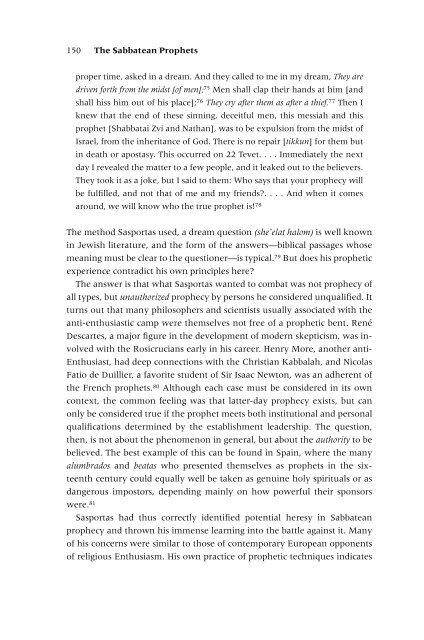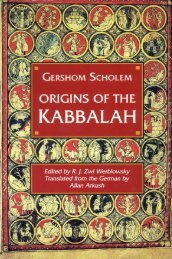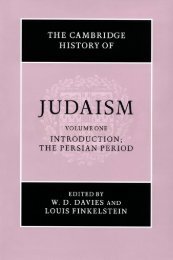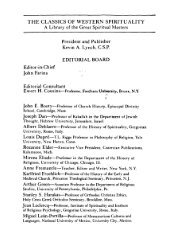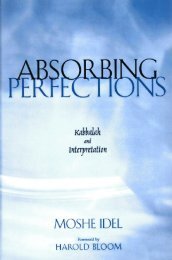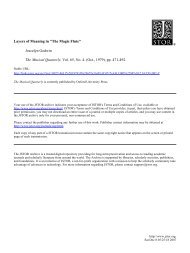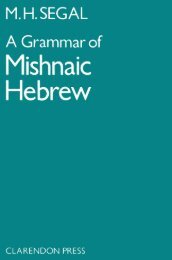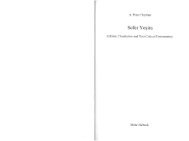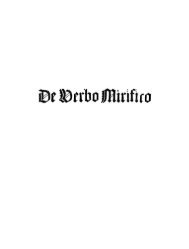Create successful ePaper yourself
Turn your PDF publications into a flip-book with our unique Google optimized e-Paper software.
150 <strong>The</strong> <strong>Sabbatean</strong> <strong>Prophets</strong><br />
proper time, asked in a dream. And they called to me in my dream, <strong>The</strong>y are<br />
driven forth from the midst [of men]; 75 Men shall clap their hands at him [and<br />
shall hiss him out of his place]; 76 <strong>The</strong>y cry after them as after a thief. 77 <strong>The</strong>n I<br />
knew that the end of these sinning, deceitful men, this messiah and this<br />
prophet [Shabbatai Zvi and Nathan], was to be expulsion from the midst of<br />
Israel, from the inheritance of God. <strong>The</strong>re is no repair [tikkun] for them but<br />
in death or apostasy. This occurred on 22 Tevet. . . . Immediately the next<br />
day I revealed the matter to a few people, and it leaked out to the believers.<br />
<strong>The</strong>y took it as a joke, but I said to them: Who says that your prophecy will<br />
be fulfilled, and not that of me and my friends. . . . And when it comes<br />
around, we will know who the true prophet is! 78<br />
<strong>The</strong> method Sasportas used, a dream question (she’elat halom) is well known<br />
in Jewish literature, and the form of the answers—biblical passages whose<br />
meaning must be clear to the questioner—is typical. 79 But does his prophetic<br />
experience contradict his own principles here<br />
<strong>The</strong> answer is that what Sasportas wanted to combat was not prophecy of<br />
all types, but unauthorized prophecy by persons he considered unqualified. It<br />
turns out that many philosophers and scientists usually associated with the<br />
anti-enthusiastic camp were themselves not free of a prophetic bent. René<br />
Descartes, a major figure in the development of modern skepticism, was involved<br />
with the Rosicrucians early in his career. Henry More, another anti-<br />
Enthusiast, had deep connections with the Christian Kabbalah, and Nicolas<br />
Fatio de Duillier, a favorite student of Sir Isaac Newton, was an adherent of<br />
the French prophets. 80 Although each case must be considered in its own<br />
context, the common feeling was that latter-day prophecy exists, but can<br />
only be considered true if the prophet meets both institutional and personal<br />
qualifications determined by the establishment leadership. <strong>The</strong> question,<br />
then, is not about the phenomenon in general, but about the authority to be<br />
believed. <strong>The</strong> best example of this can be found in Spain, where the many<br />
alumbrados and beatas who presented themselves as prophets in the sixteenth<br />
century could equally well be taken as genuine holy spirituals or as<br />
dangerous impostors, depending mainly on how powerful their sponsors<br />
were. 81<br />
Sasportas had thus correctly identified potential heresy in <strong>Sabbatean</strong><br />
prophecy and thrown his immense learning into the battle against it. Many<br />
of his concerns were similar to those of contemporary European opponents<br />
of religious Enthusiasm. His own practice of prophetic techniques indicates


